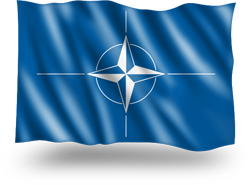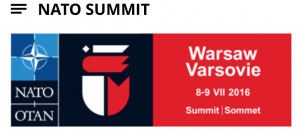The Warsaw Summit and NATO’s Reckless Bluff

NATO troop deployments to Poland and the Baltic States are a dangerous public relations move which is already backfiring.
NATO’s decision to deploy four battalions of troops on a supposedly rotating basis to Poland and the Baltic States is the worst sort of decision. However we need to stay calm. It does not mean war is coming.
 The four battalions NATO is deploying to Poland and the Baltic States cannot threaten Russia. There’s been some wild talk of how German tanks have for the first time since the end of the Second World War moved closer to St. Petersburg. I recently visited St. Petersburg. Any idea that NATO could capture or even seriously threaten St. Petersburg with just four battalions – around 3,000 men – when Hitler’s Army Group North with 23 divisions backed by a Finnish army consisting of a further 7 divisions couldn’t capture it, is simply silly.
The four battalions NATO is deploying to Poland and the Baltic States cannot threaten Russia. There’s been some wild talk of how German tanks have for the first time since the end of the Second World War moved closer to St. Petersburg. I recently visited St. Petersburg. Any idea that NATO could capture or even seriously threaten St. Petersburg with just four battalions – around 3,000 men – when Hitler’s Army Group North with 23 divisions backed by a Finnish army consisting of a further 7 divisions couldn’t capture it, is simply silly.
Not only is the force NATO is deploying to Poland and the Baltic States incapable of seriously threatening Russia but in the event of a Russian attack it wouldn’t even be able to defend itself. Media commentary in the West admits as much. It says the NATO troops are simply intended to be a “trip-wire” to deter a Russian attack on Poland and the Baltic States.
No Russian attack is planned or threatened against either Poland or the Baltic States. No one is seriously claiming there is the slightest possibility of such an attack. If NATO leaders genuinely feared such an attack they would not deploy troops to the Baltic States on what would in effect be a suicide mission, where they would be immediately overrun by the overwhelmingly stronger armies the Russians could immediately deploy to the area. Even NATO generals are not that stupid.
As for saying that the deployments are intended to reinforce the message that NATO will stand by its Article 5 commitment to defend the Baltic States in the event of a Russian attack, what that does is the exact opposite: show that the Article 5 commitment is not really cast iron and that neither NATO nor the Russians really believe it is. If it was why would there be any need to reinforce it?
So why is NATO deploying such a force to Poland and the Baltic States? Is it perhaps part of a larger plan to build up over time more forces in the area to threaten Russia eventually?
Hardly! The reality – as every serious military analyst knows – is that the US military, which is the core of NATO, is seriously overextended and has no reserves to carry out further deployments in this region, whilst the capabilities and commitment of the US’s NATO allies are now so poor it is doubtful they could seriously threaten anybody. If the British and French militaries working together could not defeat Gaddafi’s military without calling on US support during their 2011 Libyan adventure then they are in no position to take on Russia, and nor is the German army which today bares no resemblance to the force it was in the Second World War.
The true reason why NATO is deploying troops to Poland and the Baltic States has nothing to do with any of the reasons that are being said. It is because NATO is looking for some way to demonstrate publicly that it once more considers Russia an enemy and these highly provocative and illegal deployments are the way to do it. That way it hopes to mobilise European opinion behind its latest anti-Russian campaign.
This is both reckless and stupid. It effectively scraps yet another agreement and promise NATO made to Russia at the end of the Cold War, which was not to deploy Western militaries in the territories of the former Warsaw Pact. It tells the people and government of Russia – by far the most powerful country in Europe – that NATO considers them an enemy. And it does so with an outrageous bluff that any serious military analyst – of which Russia has any number – will immediately see through.
As for mobilising European opinion behind NATO’s anti Russian campaign, the effect is the diametric opposite. All that the talk of war and of military deployments is doing is alarming the Western public leading to more and more questions about where NATO is going. The leaders of Italy and France in order to reassure their publics have had to state publicly that they do not consider Russia an enemy, which is simply opening them up to more questions of why in that case they are agreeing to the deployments at all. In Germany there is now an open split between Merkel – who supports the policy as she made clear in a hardline speech to the Bundestag – and her SPD and CSU coalition partners, who have made it clear they don’t.
A policy that manages to alarm, provoke and bluff all at the same time has clearly not been thought through. The Chilcot Inquiry Report into the handling of the Iraq war lambasted the lack of basic honesty, hard thinking and serious planning behind that war. In relation to Russia – a nuclear superpower – NATO is behaving in exactly the same way.

